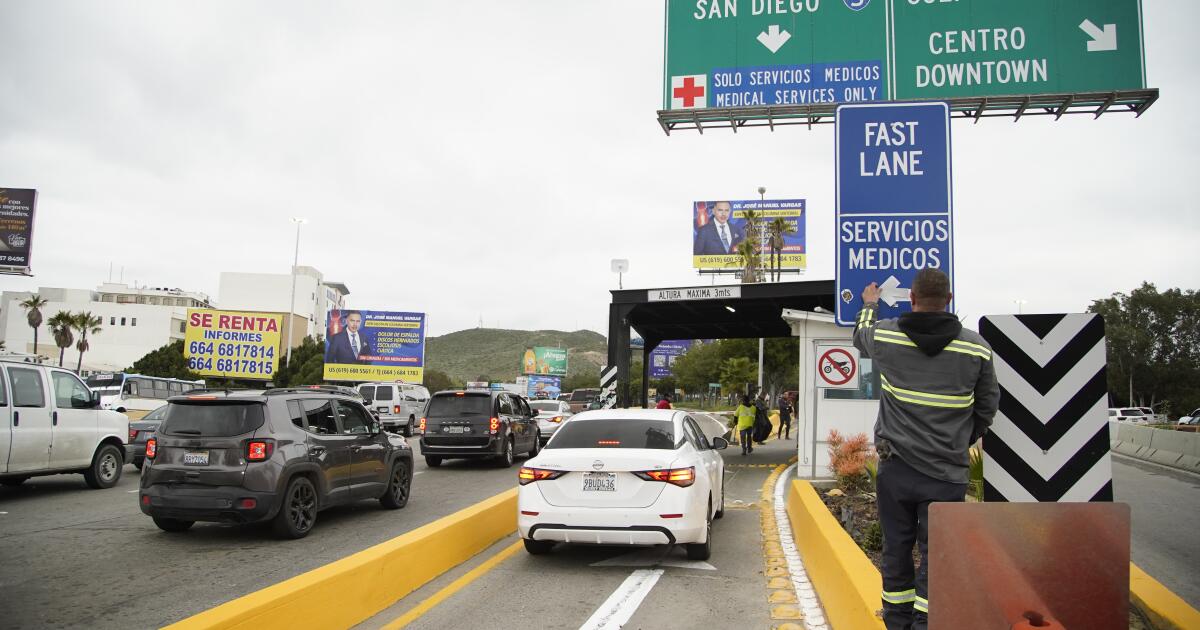
Cross-border students who wake up early every day to go to school in San Diego County can now participate in a new pilot program run by the city of Tijuana to cross the border faster. But it does not come cheap.
Eligible K-12 students can enroll in the FastLane program to use one of the designated vehicle lanes at both San Ysidro and Otay Mesa border crossings. The first students to sign up began using the fast lanes last week.
The pass essentially allows participants to feed into the vehicle inspection lanes on the Mexican side from a closer midpoint rather than having to queue up at the very end as other traffic must.
Participants arrive at one of the program’s inspection booths, where a Mexican officer verifies that everyone in the vehicle is eligible and has the required documents. The line then joins the regular lanes at the port of entry for inspection by U.S. Customs and Border Protection on the U.S. side. The program — only available for northbound vehicle traffic — is not operated by CBP and does not change the inspection process to enter the U.S.
The FastLane program was originally created for U.S. patients visiting registered doctors in Tijuana. In 2019, the program expanded to include business people visiting for investment purposes. Health care providers and business organizations typically purchase multiple passes from the city in order to give them free of charge to patients or investors living on the other side of the border.
In November, the Tijuana City Council voted to include cross-border students.
The program for students costs an annual enrollment fee of 4,185 pesos (around $246), and plus 5,819 pesos ($342) for a card good for 20 border crossings per vehicle, or about one month of morning school trips. That breaks down to about $17 per crossing.
By comparison, the price of a one-day medical pass is 389 pesos ($22) and for business people 649 pesos ($38).

A Tijuana official greets Edgar Molina, a student using the Fast Lane on Feb. 29.
(Alejandro Tamayo/The San Diego Union-Tribune)
Tijuana Mayor Montserrat Caballero defended the price. “It’s a special crossing,” she said last week as the first students used the crossing. “I think there is nothing more costly than the sleeplessness of all those families that have to wake up at 2 a.m. every day.”
The program is an alternative for families who may not qualify for or otherwise enroll in CBP’s SENTRI trusted-traveler program, which allows faster-than-normal border crossing wait times in a CBP-designated lane. SENTRI travelers must be approved by a thorough vetting process, and application wait times are long. A SENTRI pass costs $122.25 per person for five years.
Students can register for the fast lane pass at Tijuana’s City Hall. The proceeds are funneled to a public fund, which is used to promote economic development activities.
Caballero said that authorities will be vigilant to make sure there is no misuse of the fast lane passes, something that has been a problem for some time.
Up to 500 students will be allowed for now to avoid saturating the program’s designated lanes, said Luis Cañedo, Tijuana’s secretary of economic development. Officials will evaluate later whether more students can be accepted to the program, he said.
Participants will only be able to use the designated lanes Monday to Friday from 6 a.m. to 9 a.m. The average wait time is expected to be between 20 and 30 minutes, compared to up to four hours for the regular lines, he said.
The program is open to K-12 students who are U.S. citizens living in Tijuana or Mexican nationals with a student visa, officials said.
As of last week, 12 students had been granted passes, and about 150 more were awaiting approval, officials said.

Tijuana Mayor Montserrat Caballero greets commuters in the Fast Lane.
(Alejandro Tamayo/The San Diego Union-Tribune)
The idea of a designated lane for cross-border students has been floating around for a while in the binational region.
Joaquín Luken, executive director of the nonprofit Smart Border Coalition, called the program a “great step” and said he hopes that another one can be created to include students who cross the border by pedestrian lanes.
He estimated that about 10,000 students of all ages cross the border daily. “Anything to ease border crossings is welcome.”






